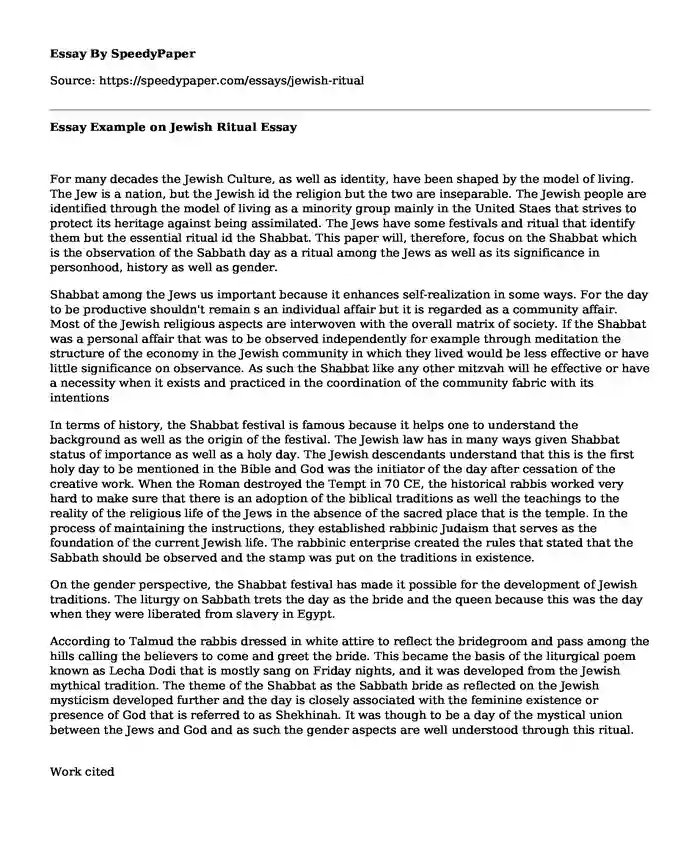For many decades the Jewish Culture, as well as identity, have been shaped by the model of living. The Jew is a nation, but the Jewish id the religion but the two are inseparable. The Jewish people are identified through the model of living as a minority group mainly in the United Staes that strives to protect its heritage against being assimilated. The Jews have some festivals and ritual that identify them but the essential ritual id the Shabbat. This paper will, therefore, focus on the Shabbat which is the observation of the Sabbath day as a ritual among the Jews as well as its significance in personhood, history as well as gender.
Shabbat among the Jews us important because it enhances self-realization in some ways. For the day to be productive shouldn't remain s an individual affair but it is regarded as a community affair. Most of the Jewish religious aspects are interwoven with the overall matrix of society. If the Shabbat was a personal affair that was to be observed independently for example through meditation the structure of the economy in the Jewish community in which they lived would be less effective or have little significance on observance. As such the Shabbat like any other mitzvah will he effective or have a necessity when it exists and practiced in the coordination of the community fabric with its intentions
In terms of history, the Shabbat festival is famous because it helps one to understand the background as well as the origin of the festival. The Jewish law has in many ways given Shabbat status of importance as well as a holy day. The Jewish descendants understand that this is the first holy day to be mentioned in the Bible and God was the initiator of the day after cessation of the creative work. When the Roman destroyed the Tempt in 70 CE, the historical rabbis worked very hard to make sure that there is an adoption of the biblical traditions as well the teachings to the reality of the religious life of the Jews in the absence of the sacred place that is the temple. In the process of maintaining the instructions, they established rabbinic Judaism that serves as the foundation of the current Jewish life. The rabbinic enterprise created the rules that stated that the Sabbath should be observed and the stamp was put on the traditions in existence.
On the gender perspective, the Shabbat festival has made it possible for the development of Jewish traditions. The liturgy on Sabbath trets the day as the bride and the queen because this was the day when they were liberated from slavery in Egypt.
According to Talmud the rabbis dressed in white attire to reflect the bridegroom and pass among the hills calling the believers to come and greet the bride. This became the basis of the liturgical poem known as Lecha Dodi that is mostly sang on Friday nights, and it was developed from the Jewish mythical tradition. The theme of the Shabbat as the Sabbath bride as reflected on the Jewish mysticism developed further and the day is closely associated with the feminine existence or presence of God that is referred to as Shekhinah. It was though to be a day of the mystical union between the Jews and God and as such the gender aspects are well understood through this ritual.
Work cited
Friedman, Michelle L., Myrna L. Friedlander, and David L. Blustein. "Toward an Understanding of Jewish Identity: A Phenomenological Study." Journal of Counseling Psychology52.1 (2005): 77.
Cite this page
Essay Example on Jewish Ritual. (2022, Nov 29). Retrieved from https://speedypaper.net/essays/jewish-ritual
Request Removal
If you are the original author of this essay and no longer wish to have it published on the SpeedyPaper website, please click below to request its removal:
- Personal Essay Example: What Cancer of My Mom Taught Me
- The Night Circus by Erin Morgenstern - Free Essay on Literature
- Free Essay about the Artifact - The Pistol of the Eureka Precinct
- Interview with a Counselor, Free Essay about a Counselor Profession
- Essay Example on the Greatest Threat to Humanity
- Diversity Verses Inclusion
- Essay Sample on Analyze the Different Aspects of Medicare Programs
Popular categories





